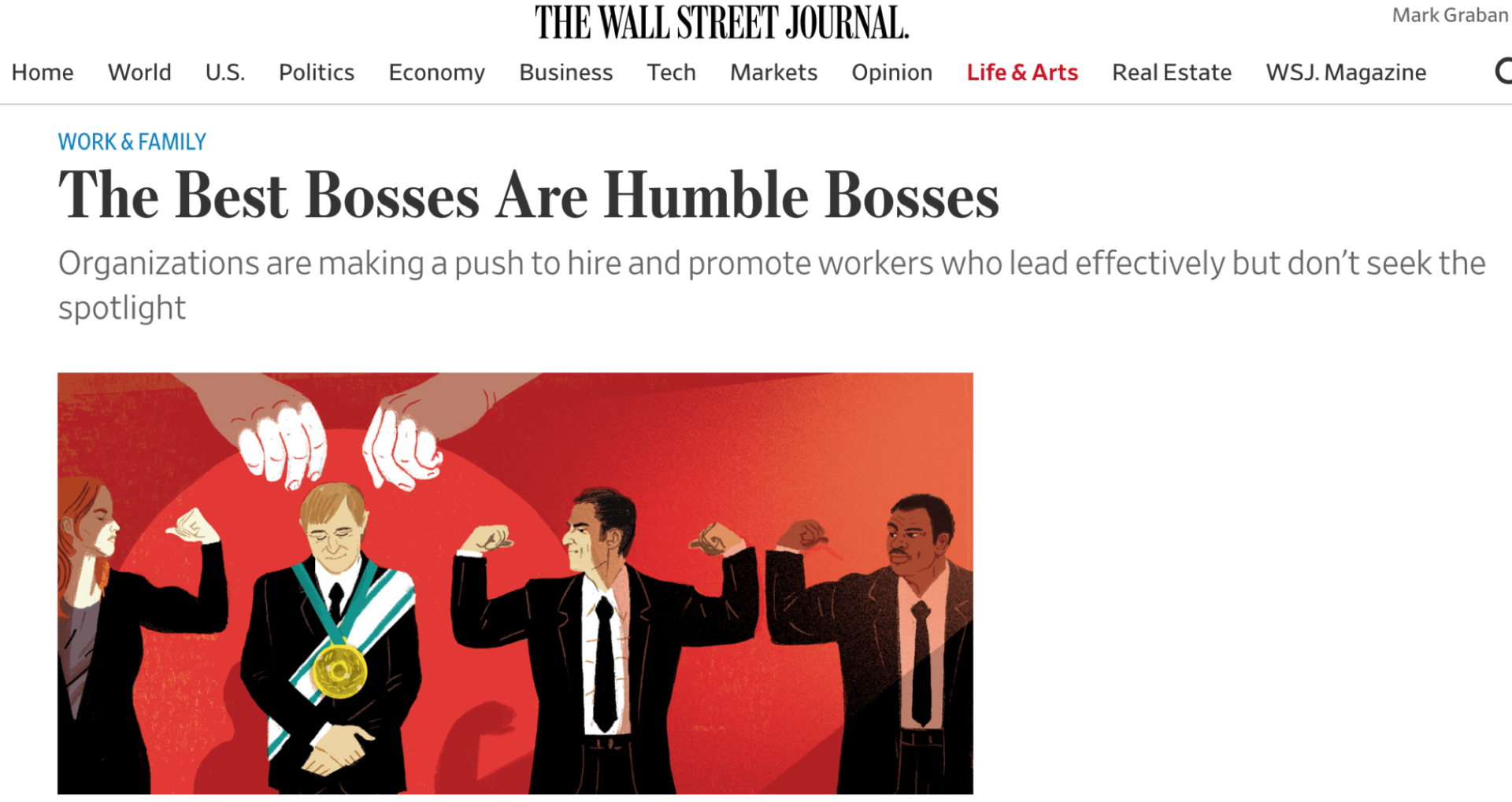This article from the WSJ caught my eye last week (might be behind their paywall):
The Best Bosses Are Humble Bosses
Organizations are making a push to hire and promote workers who lead effectively but don't seek the spotlight
This idea that humble leaders are the most effective leaders is probably not new to you if you're a student or practitioner of the Lean management methodology.
Some previous blog posts on humility:
Notes from Hearing Captain “Sully” Sullenberger Speak: Humility, Leadership, and Safety
And there's this video of Dr. John Toussaint talking about Lean leadership, which includes humility:
Back to the WSJ article, where it begins:
“After decades of screening potential leaders for charm and charisma, some employers are realizing they've been missing one of the most important traits of all: humility.
In an era when hubris is rewarded on social media and in business and politics, researchers and employment experts say turning the limelight on humble people might yield better results.”
It's not just about being humble because it's the right thing to do… not surprisingly, it might yield better results.
To me, a humble leader has the strength to engage their employees in improvement, without being threatened by that:
Great Leaders Aren't Threatened by Their Employees' Ideas or Feedback
The WSJ continues:
“Humility is a core quality of leaders who inspire close teamwork, rapid learning and high performance in their teams, according to several studies in the past three years. Humble people tend to be aware of their own weaknesses, eager to improve themselves, appreciative of others' strengths and focused on goals beyond their own self-interest.”
Nobody enjoys working for what Toussaint calls a “white coat leader” who has all of the answers (or thinks they do).
To me, the authors of the book I edited and published, Practicing Lean, embody the idea of being aware of their weaknesses and improving oneself.
So, some companies are figuring out how to screen for and hire for humility as a key personality trait.
“Hogan Assessments, a leading maker of workplace personality tests, plans to unveil a new 20-item scale early in 2019 designed to measure humility in job seekers and candidates for leadership posts, says Ryne Sherman, chief science officer for the Tulsa, Okla., company. The scale will prompt people to agree or disagree with such statements as, “I appreciate other people's advice at work,” or “I'm entitled to more respect than the average person.”
I can't wait to see that survey, if it's ever made public. Here is some research that it's based on.
There's a free assessment available online, actually. I've taken that… I wonder if we should share our humility scores? If I scored high on humility, I wouldn't want to brag about that, LOL.
What happens when you're not a humble leader?
“Most of the thinking suggests leaders should be charismatic, attention-seeking and persuasive,” Dr. Sherman says. “Yet such leaders tend to ruin their companies because they take on more than they can handle, are overconfident and don't listen to feedback from others,” he says.”
Does that remind you of Toyota or Tesla?
And there's one final key connection to Lean and continuous improvement:
“Fostering humility makes employees at all levels feel free to suggest ideas, Mr. Carter says.”
I believe that. I've seen that at organizations like Franciscan St. Francis, the health system featured in our book Healthcare Kaizen.
I agree with the assessment that decisive “top-down” leadership might be appropriate in certain settings, just as a military veteran I worked with explained that “command and control” was appropriate in life-or-death battle situations, but wasn't the default daily culture in the military. Again, from the article:
“Some challenges may call for a different leadership style. For example, employees facing extreme threats or intense time pressure might perform better when a leader takes a more authoritative, top-down approach, Dr. Owens says.
However, companies with humble chief executives are more likely than others to have upper-management teams that work smoothly together, help each other and share decision-making, according to a study of 105 computer hardware and software firms published in the Journal of Management.”
So, it seems that “humble leadership” should be the default and the daily norm, except in special situations, if you want to be a more successful organization.
What do you think? Are there downsides in some organizations for being viewed as humble?
Please scroll down (or click) to post a comment. Connect with me on LinkedIn.
If you’re working to build a culture where people feel safe to speak up, solve problems, and improve every day, I’d be glad to help. Let’s talk about how to strengthen Psychological Safety and Continuous Improvement in your organization.










Great blog, Mark. Love the topic. Being a humble leader is a challenge, especially when some view this trait as a weakness. I believe it is one of the most critical traits a leader can have, similar to being meek – which means “strength under control”!
Thanks, Matt. It’s too bad that humble or “meek” often gets interpreted as “weak.”
Comments are closed.